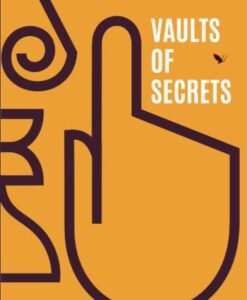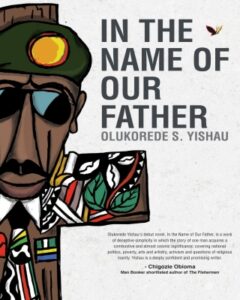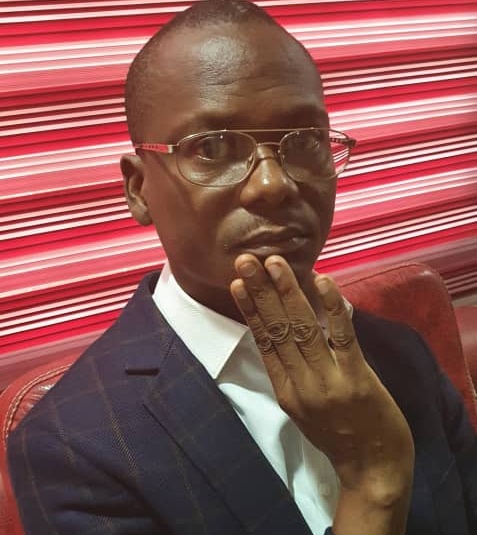Olukorede S. Yishau is an award-winning journalist, novelist and short-story writer. His first novel, In the Name of Our Father, has been a subject of thesis by students in Nigerian universities. It was published by Parrésia Publishers Limited in 2018 and described by two-time Booker finalist Chigozie Obioma as a ‘work of deceptive simplicity’. His collection of short stories ‘Vaults of Secrets’ is his sophomore.
His poems were published in an anthology of poetry ACTIVISTS POETS. His essays and short stories have appeared in different publications.
The Associate Editor of The Nation Newspaper has in his kitty honours such as Nigeria Media Merit Awards (NMMA) Columnist of the Year (2015), NMMA Entertainment Reporter of the Year (2015), NMMA Capital Market Reporter of the Year (2013), NMMA Aviation Industry Reporter of the Year (2003), Finalist, Union Bank Banking and Finance Reporter of the Year (2003), Finalist, Olu Aboderin Entertainment Reporter of the Year (2001), Finalist, Print Journalist of the Year (2005), and Finalist, Political Reporter of the Year (2006).
He holds a degree in Mass Communications from the Ambrose Alli University, Ekpoma, Edo State, Nigeria as well as a professional diploma in Public Relations.
In this online interview with Lekan Otufodunrin, Yishau speaks about his new book and shares his experience about book writing and publishing.
October 1 is the official launch of your second book, Vaults of Secrets. What are the secrets you wrote about?
As human beings, secrets are what we keep for one reason or the other; it can be because we want our privacy or because we are ashamed of what we have done. My collection of short stories deals with the two variables: secrets kept for privacy and secrets kept to avoid shame and public ridicule, but the bulk of the stories are about the latter.

There is a story about a boy who found out that his grandfather was also his father. There is also a sad and hilarious story about a man who has the special gift of walking in on people’s secrets and has perfected the art of keeping these secrets, but he kept one that he regretted keeping because it led to the end of the marriage of his best friend.
There is also the story about a married woman whose conscience decided to tell the story of how all her children were for his lover, whose wife also brought in her lover’s kids as his. And there is also a story about a different kind of secret: A woman sees a man who looks exactly like her dead husband and before she can find out the reason for the semblance, he has an accident and dies. She believes there is a secret behind the resemblance but death robs her of the right to find out whether or not there is really a secret.
Why did you take to book writing and present them in the way you do?
I have always liked writing and right from my secondary school at the Ansar-Ud-Deen Grammar School, Isaga-Orile near Abeokuta; I have always known that I was going to do something serious about this talent.
Even while in secondary school, I wrote what I considered a novel. When I decided to be a journalist, half of my writing dream was fulfilled; the other half took a break for some time but it is fully back now. I decided to wake the creative writing part of my life because I like telling fictional stories. In waking it up, I knew it must be presented in a special way.
I believe perception matters a lot. If you write the best book and no one knows anything about it, it will remain on the shelves and gather dust. So, what I do is to make sure I have a good product, get it packaged the best way possible and then unleash it on the reading public with as much publicity as possible. It is not always true that a good product will sell itself. If no one is aware of it, it will waste.
What does it take to write must-read fiction as you do?
I think the starting point for writing fiction is talent, but talent alone is not enough; it must be supported with learning the techniques of writing. And there is no way to sharpen writing skills other than reading and writing.
Professor Wole Soyinka once said the best way to learn a craft is to study the masters. So, over the years, despite my belief that I have the talent, I have read widely. This year alone, I have read about 50 books and I will read more before the year runs out. I am yet to see a good writer who does not read.
After knowing the trick, you then have to come up with plots and characters that will keep the readers flipping the pages of your book. A book with badly developed characters and plots and unbelievable dialogues will only interest its writer. So, a must-read fiction must have an intriguing story and flawed characters, unpredictable plot and believable dialogues help to achieve the magic of getting the reader to keep flipping the pages and screaming for joy. A good book will force you to read even when you don’t want to and you can only achieve that with a fantastic story told in irresistible prose and free-flowing style.
What is your advice for journalists who want to write books and earn additional income?
Writing a book requires discipline. Journalists are always talking about time and claiming they do not have time. But, if you want to author a book and I am not talking about compiling articles written over a period of years, you just have to create the time. Without this, you can’t write a book.
You must be discipline to decide what time you would be able to write. It could be early morning before going for assignments or to your beat; it could be at night after getting home, or it could be weekend. As a matter of fact, it could even be during your free period in the office.

Anytime I am working on a new project, I write early in the morning. When I am set for the office, I will either copy it on a memory stick or send to my e-mail and when I have a free few minutes, I write and when I need to attend to my official duty, I save what I have done.
Abroad, journalists are given leave of absence by their employers to write books on issues relating to their areas of specialisation. I hope we will get there someday in Nigeria, but until then, you have to create the time. At the worst, you can write during your annual leave, which we all are entitled to.
What others lessons have you learnt from book publishing you want to share with our readers?
Book publishing in Nigeria is not easy. Writing a book is one thing, publishing it is another. I always tell people that writing fiction is an art, but publishing, which will bring the book out, is a business so unless publishers are sure of the return on investment, to hell with your art.
Most first-time authors have to self-publish their work because, for publishers, they have to be sure of their return on investment before they put their money on you. So, if you have to self-publish, you have to raise money for every process of publishing, including marketing and distribution.
READ ALSO: BOOKS BY JOURNALISTS
Big publishing firms in Nigeria prefer to publish textbooks because of return on investment. What I usually advice people is that they should build a network over the years and use that network as their fan base when they become authors. They can also work on using their links to get organisations and well-heeled individuals to buy bulk copies for distributions free of charge to students.
How can interested persons get copies of your book?
For interested readers outside Nigeria, the book is available on Amazon so if you are in the United States, Canada, Australia, China, the United Kingdom, Amazon will deliver the book in a matter of days. In some parts of the UK, you can even get it delivered in 24 hours.
For readers in Nigeria, the book is available at bookstores, such as Page Book Connoisseur on Allen Avenue, Ikeja, RovingHeights in Surulere, Bookville World in Port Harcourt, Adam’s Pages in Abuja, Booksellers in Abeokuta, Ibadan and Lagos and many other bookstores across the country.
For lovers of kindle and e-books, the book is available on Amazon Kindle and okadabooks.com.

